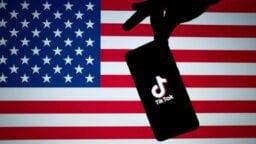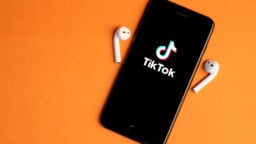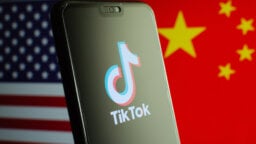The battle between TikTok and Universal Music Group just entered a significant new phase.
TikTok has today (February 27) confirmed that it’s already begun removing Universal Music Publishing Group (UMPG) songs from its platform – three whole days before the UMPG catalog becomes unlicensed for use on TikTok.
As if you need to be reminded, UMG’s distributed recordings catalog (comprised of around 3 million tracks) became unlicensed for use on TikTok on February 1 after UMG’s agreement with the ByteDance-owned platform expired very publicly on January 31, 2024.
Megahits by UMG-affiliated megastars including Taylor Swift, Olivia Rodrigo, Billie Eilish, and more have gone quiet on TikTok over the past few weeks as a result of that copyrighted content being removed.
The Universal Music Publishing Group catalog has been available on TikTok all this time however, because UMPG’s agreement with TikTok included a ~30-day ‘grace’ period, giving TikTok an additional month of use of UMPG-represented compositions vs. UMG’s recordings.
This Friday (March 1), TikTok’s current license for the Universal Music Publishing Group catalog – spanning some 4 million songs – officially expires.
A renewed deal between TikTok and UMG is now looking highly unlikely by March 1, though, – due to the fact that TikTok says it has already started to remove all music licensed by UMPG from TikTok ahead of the deadline.
TikTok is not only removing songs that are fully controlled by UMPG (i.e 100% written by UMPG writers).
Any recording of a song currently available on TikTok that has been co-written by a songwriter signed to Universal Music Publishing will also need to come down in the event of UMPG’s license expiring.
As a result, all of the videos on TikTok that feature these UMPG-affiliated songs will also be muted.
Stars signed to non-Universal record companies whose publishing is administered by UMPG include Adele, Harry Styles, SZA, Rosalía, Justin Timberlake, and Bad Bunny.
How big a deal is this latest development in the TikTok vs UMG licensing feud?
As MBW reported yesterday, senior industry sources estimate that “up to 80% of relevant repertoire” on TikTok – i.e. current and proven hits – would be impacted by TikTok’s removal of UMG’s (combined) publishing and recorded music repertoire.
However, a TikTok spokesperson strongly challenged that figure yesterday, telling us: “TikTok can confirm that in the US and UK, UMG and UMPG combined is approximately 30% of popular music on the platform, and even less everywhere else.”
In other words: according to TikTok, 70% of “popular music” on the ByteDance platform today is neither distributed by UMG, nor contains any songwriting credits from a UMPG-repped writer.
(We explored several reasons yesterday why TikTok’s 30% claim is surprising.)
Intriguingly, TikTok also now claims that it hasn’t seen a decline in its user base since UMG’s recordings catalog was removed from its platform.
Lest we forget: Last year, TikTok conducted a “test” in Australia, in which it restricted user access to some major label music in the market.
The platform’s “test” effectively ‘muted’ some major record company-signed tracks on videos in Australia to test user behavior.
The number of people using the app in the market declined (according to figures from Data.ai via Bloomberg) after that test was rolled out – though sources within TikTok dispute these figures.
Alongside the announcement last month about the expiration of its deal with TikTok, Universal published an ‘open letter to the artist and songwriter community’, in which it detailed the reasons why the companies’ negotiations have ended without a deal.
UMG said in the letter that during its contract renewal discussions with TikTok, it has been “pressing” the platform on “three critical issues” including “appropriate compensation for our artists and songwriters, protecting human artists from the harmful effects of AI, and online safety for TikTok’s users”.
In an official statement in response to UMG’s announcement, TikTok said: “It is sad and disappointing that Universal Music Group has put their own greed above the interests of their artists and songwriters.
“Despite Universal’s false narrative and rhetoric, the fact is they have chosen to walk away from the powerful support of a platform with well over a billion users that serves as a free promotional and discovery vehicle for their talent.
“TikTok has been able to reach ‘artist-first’ agreements with every other label and publisher. Clearly, Universal’s self-serving actions are not in the best interests of artists, songwriters and fans.”
In response to those comments, on Thursday February 1, UMG said: “TikTok’s own statement perfectly sums up its woefully outdated view: Even though TikTok (formerly Musical.ly) has built one of the world’s largest and most valuable social media platforms off the backs of artists and songwriters, TikTok still argues that artists should be grateful for the ‘free promotion’ and that music companies are ‘greedy’ for expecting them to simply compensate artists and songwriters appropriately, and on similar levels as other social media platforms currently do.
“TikTok didn’t even attempt to address the other issues we raised regarding harmful AI and platform safety. It’s no surprise that artist rights advocates are speaking out in support of our action.”
The likes of Primary Wave, Downtown, Hipgnosis, and the National Music Publishers Association have all publicly backed UMG’s refusal to re-license TikTok for the terms on offer.
Earlier this month, UMG also earned another supporter in this fight: A2IM, the US trade body that represents over 600 independent recorded music companies including Beggars Group, Secretly Group, Partisan, Cinq Music, Better Noise, and Yep Roc.
In an op/ed published on MBW, A2IM chief, Dr. Richard James Burgess, argued: “In an industry that systemically underpays artists and labels, TikTok’s payment methodology is uniquely disadvantageous.”
Following the publication of that op/ed on February 7, MBW contacted Denis Ladegaillerie, founder and CEO of Believe, for his reaction to the UMG/TikTok situation.
Ladegaillerie, in an emailed statement (remember, in direct reaction to the question of UMG vs. TikTok), said: “Believe’s mission is to support artists’ development at all stages of their careers.
“TikTok is an important partner in our goals. Their commitment to work with Believe has accelerated the discovery and development of countless artists, and together we have built long-term services and valuable monetization for our artists and labels.”Music Business Worldwide



